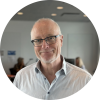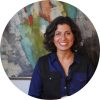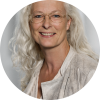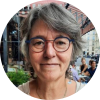Sara Pilia | Keynote speaker | ||
Norbert Bencze | Panelist and moderator | Norbert Bencze is a General Board Member and the Coordinator of the Equitable Opportunities and Sustainable Research Cultures Working Group at European Council of Doctoral Candidates and Junior Researchers (Eurodoc) and a Presidential Commissioner responsible for the Ambassador System at the Association of Hungarian PhD and DLA Candidates (DOSZ). He completed his PhD in Applied Linguistics focused on educational development. Besides policy making processes, he participates in academic programme assessment as evaluation specialist of the Hungarian Accreditation Committee. He is an active teacher, course designer and developer. He is committed to the development of international communities and to equitable opportunities in academia. | |
Laura Weihl | Panelist | Laura Weihl is a PhD candidate at the IT University of Copenhagen working on reliable AI for underwater robotics, where she focuses on adapting cutting-edge computer vision techniques for underwater environments. Her research sits at the intersection of AI reliability and marine technology, tackling the unique challenges that underwater conditions present for computer vision systems. Beyond the lab, she is passionate about making academia more inclusive and accessible - she leads a working group at Eurodoc on Doctoral Supervision, where they recently developed a statement on doctoral supervision standards across the EU. When she's not diving deep into code or policy work, you can find her by the piano or singing with her choir. She's driven by the belief that we can build both better technology and better academic environments for the researchers who come after us. | |
Alex Klinge | Panelist | Alex Klinge is an associate professor of communication at the Department of Management, Society and Communication at CBS. Alex served as a head of department at CBS for ten years and subsequently five years as the director of a CBS graduate programme in International Business Communication. In 2017 Alex became the second Equal Opportunities Officer of CBS, a part-time function he still occupies, and a function which spans both academic and administrative staff as well as students. | |
Nanna Inie | Panelist | Nanna Inie is a human-computer interaction researcher with specializations in cognition & computation, computing education, and AI safety. She uses mixed-method designs to study how humans use technology to extend their cognitive abilities, evaluate how technology affects human cognition in return, and to transform findings into the design of novel cognitive augmentation technologies. Her current research agenda explores the cognitive cost of generative AI, focusing on the adverse impact and long-term risks of outsourcing cognitively complex tasks to generative AI in knowledge-intensive and creative work. | |
Mira Skadegård | Keynote speaker | Dr. Mira C. Skadegård is a Senior Advisor in Social Sustainability and Diversity, Equity, and Inclusion (DEI), and an Associate Professor at Aalborg University in Copenhagen, Denmark. She holds a PhD in structural discrimination, and her work is dedicated to examining systemic and structural forms of discrimination and oppression in both organizational and everyday contexts. Mira’s research and advisory work are grounded in an interdisciplinary and intersectional approach, with a strong foundation in human rights. Her expertise spans equity, diversity, social sustainability, and the prevention of discrimination. She actively engages with EU and international frameworks, including the UN Guiding Principles on Business and Human Rights (UNGPs), OECD guidelines, the Corporate Sustainability Reporting Directive (CSRD), and the Corporate Sustainability Due Diligence Directive (CSDDD). In addition to her academic and advisory roles, Mira is a sought-after public speaker and a frequent contributor to public discourse. She serves on the boards of several organizations and NGOs, and has published widely in both academic and non-academic outlets. She regularly presents her work in both Danish and English. | |
Valeria Borsotti | Keynote speaker | Valeria Borsotti is a researcher in human-centered computing, currently working as a Postdoc at the Faculty of Health and Medical Sciences, University of Copenhagen (Denmark). Her research explores how scientific institutions engage with issues of equity and accessibility, with an emphasis on their socio-technical practices. Her work has explored equity & organizational accountability in tech institutions; accessibility and neuroinclusivity in higher education, and issues of access in public digital systems. Valeria has a mixed background in Computer Science and Anthropology. | |
Moritz Böhme | Moderator | ||
Emma Day | Panelist | ||
Susanne Ditlevsen | Panelist | ||
Monica Dietl | Panelist |











